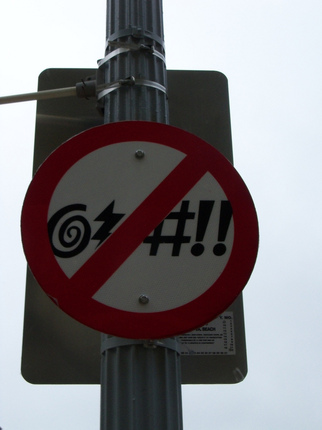
You have to really mean it, and mean it to hurt.
Middleborough, Mass., was widely ridiculed for passing an ordinance that outlawed bad words in public. This being the Age of Irony, the best a lot of critics could do was offer a string of swear words in response.
What followed was a mostly meaningless debate that seemed to center around the question of whether words really matter.
Other cities have trod similar paths lately. Columbia, S.C., announced late last year it would begin enforcing an age-old ordinance against potty mouths.
| | People who hear coarse language can "call the Columbia Police Department at 545-3500 and we are happy to put some 'No Profanity' signs up in your area," Police spokeswoman Jennifer Timmons was quoted as saying on the WISTV web site. In tiny Wisp, Wash., the town council thought long and hard about ticketing cussing, then decided it wasn’t really a community priority, and it might not be legal. But Ogden’s approach is to outlaw profanity when it is used as a weapon to disturb the peace, particularly at city parks and as part of recreation programs. Police believe they can more easily stop fights from breaking out at, for instance, recreational softball games, if they have a way to detain and fine people for trying to incite violence before it actually breaks out. Right now they have to wait for the first blow. In other words, you can still use a popular reference to sexual intercourse if it is a mindless adjective, but not if you urge someone to do it to himself because the batter really should have been called out. It’s a shame we have to parse bad behavior this way. As I’ve written before, standards of appropriate language define social interactions, set boundaries for civil discourse and ultimately make it possible to rationally debate and solve problems. Bad words are given that label because they demean or belittle something others consider sacred, and they bring intelligent discourse to a screeching halt. It is not, as Columbia University’s John McWhorter recently wrote on CNN.com, a way for society to keep it real. He wrote: “We are an informal society. We dress scantily compared with earlier Americans. We talk openly about sex and excretion in a way that still shocks our grandparents. We cherish the ‘real.’ Our sense of profanity lags behind our reality.” Quite the contrary, profanity hides and obscures what is real. People who use the F-word in common speech don’t really mean the noun they are modifying is copulating. The S-word doesn’t literally mean excrement. People don’t really mean an all-knowing God is casting whatever thing to which they refer into eternal torment. At best, the words replace real thought and expression with meaningless gibberish. At worst, they insult something to which others attach meaning. That often leads to hurt feelings or an escalation of bad behavior into violence. Ogden, and other cities, would be wise to add some arrows to their police departments’ quivers to stop that sort of thing before it gets out of hand. |

 RSS Feed
RSS Feed

